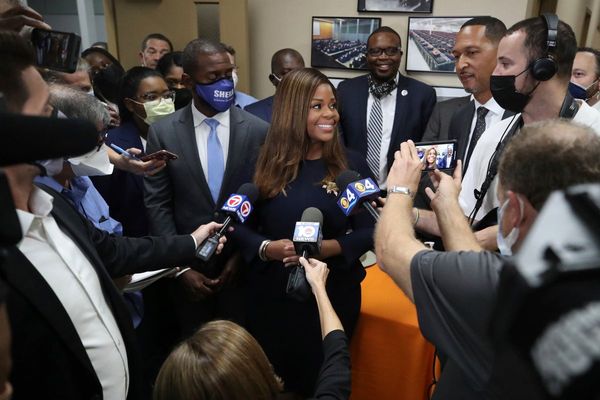
Senator Elizabeth Warren of Massachusetts has said that the next independent Department of Justice “should investigate” the private donations that have funded the construction of the new White House ballroom.
Warren – who is the top Democrat on the Senate banking committee – told the Guardian in a statement that the ballroom could be “a golden crime scene” and urged the next administration to “follow the money” to uncover “whether any crimes were committed” in its financing.
“Government officials and corporate executives should read the law: the statute of limitations is five years for federal bribery charges,” Warren added, noting that a future justice department could still be within the window to launch an investigation.
In response, Karoline Leavitt, the White House press secretary, said that “the same critics who are wrongly claiming there are conflicts of interests would complain if taxpayers were footing the bill”.
She added that the donors represent “a wide array of great American companies and generous individuals, all of whom are contributing to make the People’s House better for generations to come”.
This week, Warren also co-sponsored a bill with Robert Garcia – the ranking member on the House oversight committee – that would impose donation restrictions on the ballroom project, which has seen the demolition of the entire East Wing of the White House.
The administration recently revealed a list of companies that have donated to Donald Trump’s ballroom development – now coming in with a $300m price tag. This included tech giants such as Apple, Amazon, Meta, Microsoft and Google; defense contractors Booz Allen Hamilton, Lockheed Martin and Palantir; and telecommunications giants T-Mobile and Comcast.
Last month, the president hosted a dinner for company representatives and billionaire individuals who made significant contributions to the renovation. Many of the companies donating are in business with the administration already, and rely on significant government contracts, or would benefit from favourable legal treatment. Ethics experts have warned that their donations could afford them outsized influence or preferential treatment from the White House.
“The highest office in the land should never be for sale, nor should it ever appear to be,” said Virginia Canter, chief counsel and director for ethics and anticorruption at Democracy Defenders Action in a statement.
“Americans shouldn’t have to wonder whether President Trump is building a ballroom to facilitate a pay-to-play scheme for political favors. My new bill will put an end to what looks like bribery in plain sight,” Warren said of the bicameral legislation earlier this week.
Meanwhile, Garcia said that it’s “outrageous” that the “people’s house could be funded by shady figures, corrupt money and bad actors”. He added that the Stop Ballroom Bribery Act would “ensure we can hold any administration accountable for blatant corruption”.
In a recent interview the CEO of JP Morgan, Jamie Dimon, explained to CNN why his company would not help finance the ballroom. “Since we do a lot of contracts with governments here and around the world, we have to be very careful about how anything is perceived,” Dimon said. “And also how the next DoJ is going to deal with it.”
“We’re quite conscious of risks we bear by doing anything that looks like buying favors or anything like that,” he added.
The legislation includes a ban on donations that present a conflict of interest, institutes a two-year “cooling off” period before a project donor can lobby the federal government, force donors to disclose any meetings with the federal government within a year of their contribution and require Congress to approve any foreign government donations. The scope isn’t limited to the White House grounds, but also extends to the vice-president’s residence, Camp David and Air Force One.
The bill, however, will face an uphill battle in both Republican-controlled chambers, and is unlikely to pass. It is the latest effort from Democrats to glean more about the specifics of who is funding the ballroom project. Last month, Warren sent a letter to the Trust for the National Mall – the bipartisan non-profit which is in charge of collecting private donations for the ballroom project – to ask for specific details about the nature and amount of the contributions. She wrote that the trust appeared to be “a vehicle for politicized fundraising, influence peddling, and donor access to President Trump”.
The trust’s president, Catherine Townsend, wrote back insisting that her organization is “managing” donations and “not soliciting” donors for the project. She added that the trust had no role in the “planning, design, or construction” of the new ballroom, but under federal law she could not provide lawmakers with donor names or identifying information.







